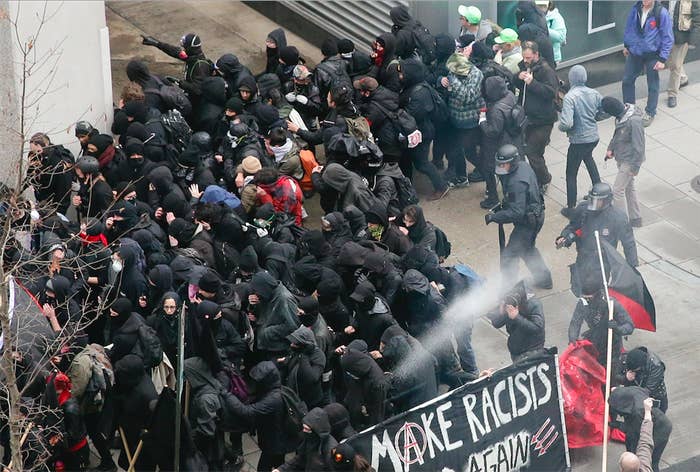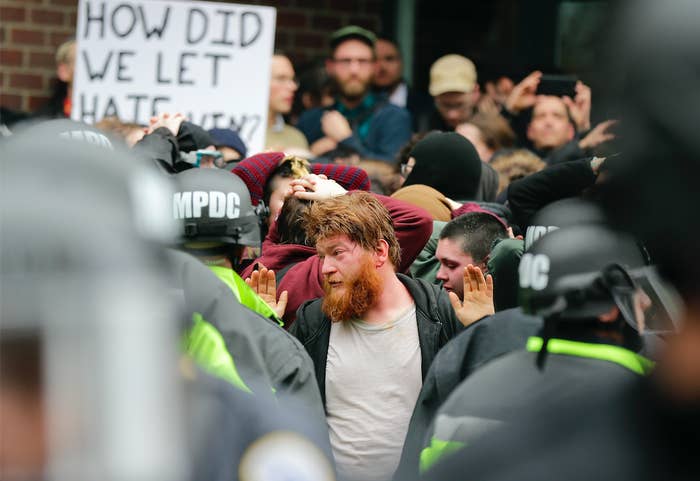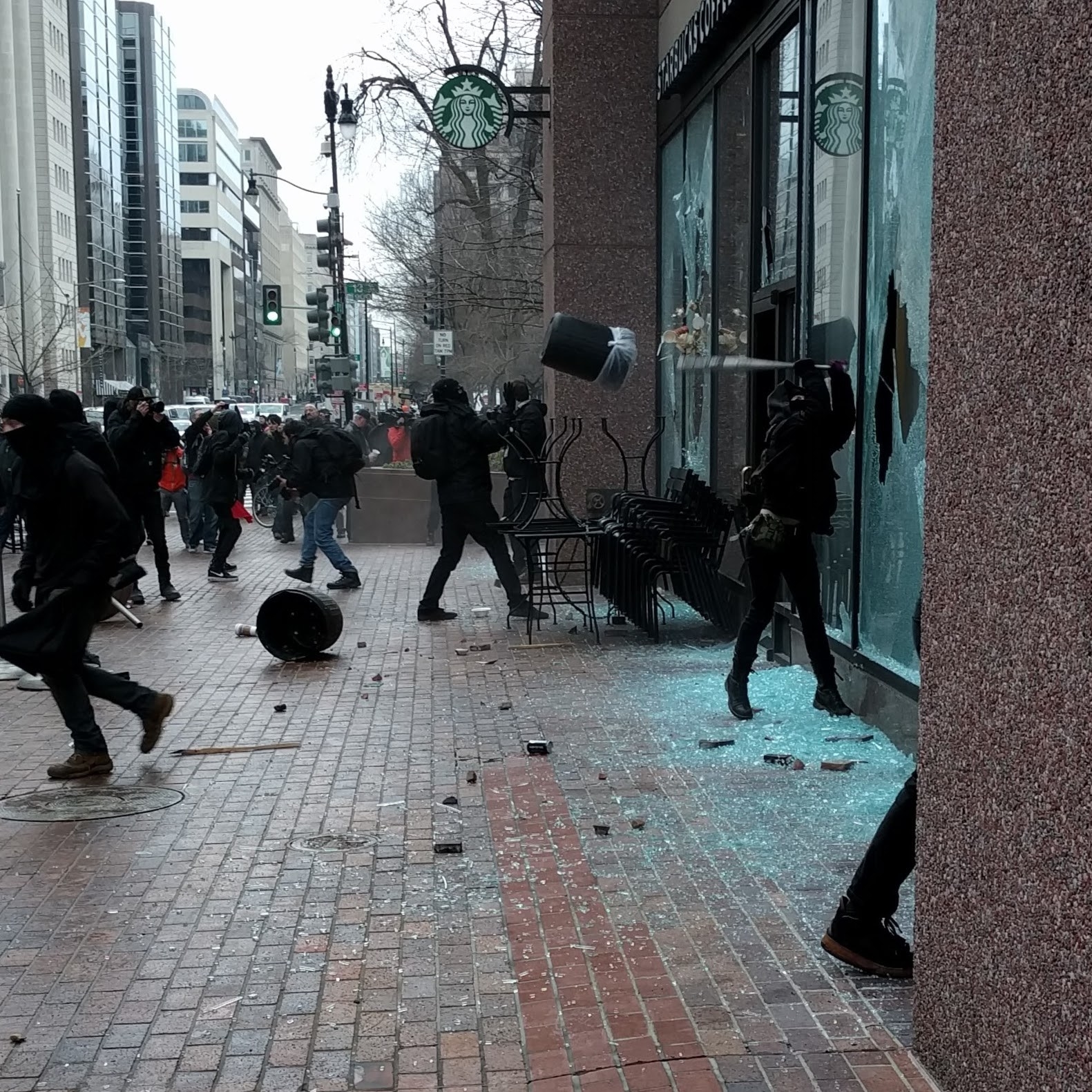
Nearly a year after police arrested more than 200 people during protests in Washington, DC, during President Donald Trump’s inauguration, the first set of defendants will face a jury this week.
Of the 194 defendants with cases pending, six will go on trial starting Wednesday in District of Columbia Superior Court. They each face at least eight charges for rioting, inciting others to riot, conspiracy to riot, and multiple acts of property destruction. Of the eight main charges, all but two are felonies, and the most serious counts carry maximum penalties of 10 years in prison.
Prosecutors have denied any political motivation, maintaining that the stiff charges are tied to the level of the property destruction and violence in downtown Washington on Jan. 20. But for anti-Trump activists and free speech advocates, the cases represent a push by the Trump administration to quash dissent and send a chilling message to would-be protesters.
The defendants are being tried in small groups, with more trials scheduled for December and throughout 2018. Mark Goldstone, a lawyer for two defendants with trial dates in 2018, said both sides will be watching to see how the first jury responds to the competing themes laid out by the government — that the defendants conspired to cause violence and mayhem — and the defense — that people engaging in protected political speech are being punished because of a few bad actors.
“It has huge implications for how the Trump Justice Department is going to view these street clash-type of situations. Are they going to take a strictly pro-law enforcement line, which is what they’ve been doing, or are they going to take a more nuanced view,” Goldstone said. “If the government wins, this may set a tone for the next couple years, until Trump gets impeached.”
Earlier in the week, defense lawyers were scrambling to make sense of a surprise announcement by prosecutors on Monday that they were dropping the felony charges against seven defendants scheduled for trial on Dec. 11. Prosecutors haven’t announced changes in any other cases. In an email to BuzzFeed News, a spokesman for the US attorney’s office confirmed the changes and said all other trials will proceed on the felony charges. He declined to comment on the reason for the decision. With only misdemeanor charges — and lower maximum penalties — for rioting and property destruction at play, that trial will be decided by the judge, and not a jury.
Court filings and earlier hearings have offered a preview of what the jury will see as the first trial gets underway. Prosecutors are likely to play clips from an extensive collection of videos, photos, and audio files that depict the events of Jan. 20. In a court filing earlier this month, prosecutors said they may introduce evidence culled from dozens of photos and videos captured by police cameras, restaurant surveillance cameras, and the cell phones and cameras of some defendants.
The defendants have fought the charges from the start — for the most part unsuccessfully — and have tussled with the government over what evidence the jury can see and who can testify. One defendant in the Nov. 15 trial group, Jennifer Armento, asked DC Superior Court Judge Lynn Leibovitz to block prosecutors from referring to encrypted data on her cell phone, arguing the term “encrypted” is “nefarious” and would be “highly prejudicial.” The judge has yet to rule on that request. The government had opposed a defense witness who would talk about protest strategies, but the judge said he could testify.
In October, one defendant, Arturo Vasquez, whose trial is scheduled for May 2018, asked the judge to strike the terms “rioting defendants” and “black bloc” from the indictment, arguing the terms were “inflammatory” and “prejudicial.” A number of defendants have joined the motion. The judge has yet to rule.

The trials will test the strength of an argument that defense lawyers have made from the start: that prosecutors failed to present specific evidence tying individual defendants to the alleged rioting. The indictment for the most part doesn’t specify which individual defendants engaged in particular acts of property destruction — breaking the windows of a BP gas station and a Starbucks, for instance — but rather accuses the defendants as a group.
Although the defendants are being tried together, they’re not putting on a joint defense led by a single lawyer or committee. Defense lawyers are each expected to get a chance to question witnesses and put on evidence specific to their clients, if they choose to do so. Assistant US Attorney Jennifer Kerkhoff, the lead prosecutor, has previously said she expects the government to take about two weeks to present its case to the jury.
Goldstone said one challenge for defense lawyers may be contending with a solidarity pledge that many defendants have signed onto. As part of the pledge, the defendants agreed to not take any actions in the case that could harm each other. If a lawyer believes that a client’s best defense involves blaming something on another defendant, it could put the lawyer in a bind, Goldstone said.
Abbe Smith, an attorney for one of the defendants who pleaded guilty, Dane Powell, said she expects defense lawyers to press the argument that the defendants were overcharged, and that any bad acts committed that day were not “felonious,” even if the value of property damage met the threshold for a felony charge. She said people arrested during past protests in DC that resulted in significant property damage — the 2000 demonstrations against the World Bank and IMF, for instance — did not face felony charges.
“These kinds of cases are generally charged as misdemeanors ... The prosecutors tend to be low key about that, they're not out for blood,” said Smith, the director of the Criminal Defense and Prisoner Advocacy Clinic at Georgetown University Law Center. “That's not what we're seeing here. That has to be a reflection of what's coming from the top, in my opinion. I'm not seeing a very measured response.”
Black bloc
Anti-Trump protests took place across Washington on Jan. 20. Most were nonviolent. Some protesters formed human chains in the morning to block inauguration attendees from accessing checkpoints. Others participated in large rallies elsewhere in the city. Police were present at these events, and intervened when scuffles broke out between Trump supporters and protesters, but there were no arrests.
The demonstration that did end in the mass arrests was billed as an “anti-capitalist, anti-fascist” protest. Many participants wore black clothing and face masks, a tactic referred to in court documents as a “black bloc,” which can make it harder for law enforcement to identify people. Defense attorneys have pushed back on the extent to which prosecutors can use the fact that someone wore black as proof that they may have engaged in criminal activity.
The march started at Logan Circle in Northwest Washington, about a mile and a half north of the National Mall, where Trump was sworn in. The demonstrators began walking south at around 10:20 a.m., with journalists and legal observers following them. Some participants tipped over trash cans and newspaper boxes. As they proceeded into the heart of downtown, the property destruction escalated, with some individuals breaking the windows of storefronts and cars.

Approximately 30 minutes after the march started, police surrounded a large group at the corner of 12th and L Streets, and made more than 200 arrests. Clashes between police and protesters continued throughout the rest of the day — the widely circulated image of a limousine on fire happened later in the day — but the bulk of arrests came from the group corralled at 12th and L. A handful of defendants were charged after Jan. 20.
A group of protesters and legal observers are suing the police, accusing them of using excessive force before, during, and after the arrests. That case, filed in the US District Court for the District of Columbia, is pending. Prosecutors dropped charges early on against most of the journalists and legal observers who were caught in the mass arrests, but charges are pending against at least two individuals who say they were acting as journalists that day, Aaron Cantu and Alexei Wood, one of the defendants in the first trial group.
Of the 234 people arrested in connection with the alleged property destruction and other violence, 20 people have pleaded guilty to date, and prosecutors have dropped charges against 20 others. Of the defendants who pleaded guilty, only one spent time in jail — Dane Powell, Abbe Smith’s client. Powell was the only person to plead guilty to a felony so far, and spent four months behind bars.
Powell’s case provided some insight into how Leibovitz is thinking about the evidence in these cases. His four-month sentence was less than the six months sought by prosecutors, but more than what Powell’s lawyers wanted, which was no jail time at all. Leibovitz said at the time that she thought a sentence that didn’t involve prison would be inappropriate, given that Powell admitted to breaking store windows and throwing objects at police officers.
The cases have also spurred side disputes over how much access the government can get to electronic data that may be related to the case. Judges have in large part allowed prosecutors to go ahead with search warrants for Facebook accounts and a website that was used to plan Jan. 20 protests, but imposed some limits on that access, citing concerns about privacy and the First Amendment protections for political speech. Lawyers will be watching to see how much social media activity by defendants factor into the government’s case.
The government will “need to do more than suggest guilt-by-association to prove conspiracy,” Smith said. “Just because there’s a conversation on social media, does that mean people are agreeing to act in concert?”
CORRECTION
The six defendants in the first trial group face eight charges. A previous version of this story incorrectly stated that one defendant also faced a charge of assaulting a police officer. Prosecutors previously dismissed that charge.

